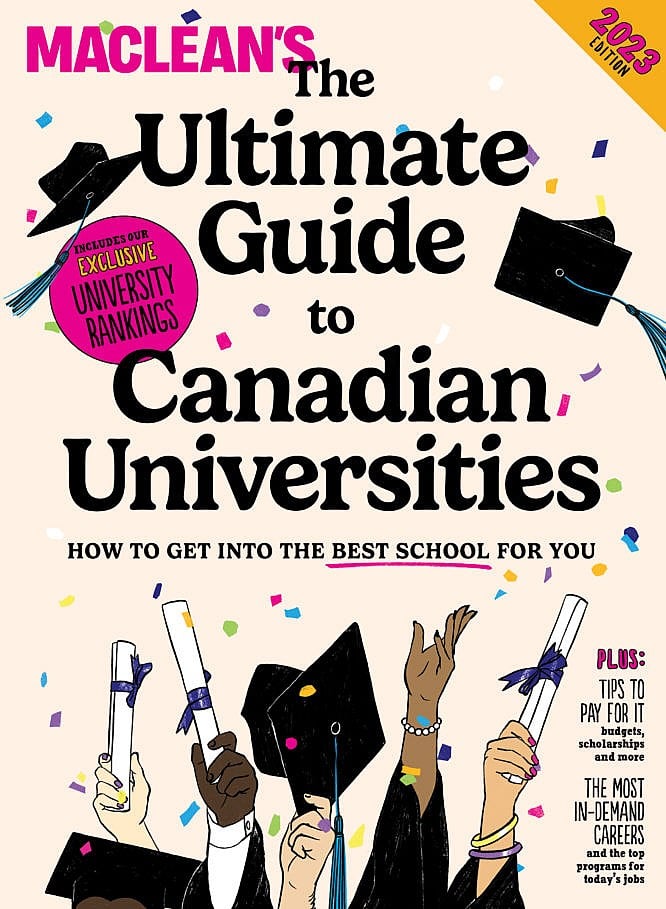The best application help money can buy
Many students are turning to admissions coaches to help write application essays and game their chances of acceptance at their top-pick schools. The cost? Almost as much as a year’s tuition.

Share

This story appears in the Maclean’s University Guidebook 2023, available now for just $19.99. Order your copy here.
Chloe, an athlete and student council president with excellent grades, seems like the kind of Grade 12 student who could get into any university in Canada. (She asked me to withhold her surname, not wanting to jinx her chances of getting accepted.) Ambitious and organized, she’s had her heart set on McGill for a couple of years, but applied to nine other schools to round out her options. She found herself stressed out by the process: many schools required her, in addition to submitting grades, to write supplemental essays detailing her personal experiences and goals, a common requirement among competitive programs. The support available at her public high school in Toronto was underwhelming, especially when she compared it to the level of attention received by her friends in private school. “My guidance counsellor has told me repeatedly that I’ll be fine wherever I go,” she says. She found this attitude patronizing and unhelpful. So, like a growing number of high school students who are overwhelmed by university applications, Chloe sought out the services of a consultant.
University consultants offer paid services to students looking to sharpen their admissions profile, coaching them on things like writing essays and the curation of extracurricular hobbies. Some students have no idea which university to attend and want help to figure it out. The growing demand for consultant services mirrors students’ escalating anxiety around university admissions, which are becoming increasingly competitive at many schools as more and more students apply. There were 2.7 million post-secondary students in Canada in 2020, representing an 81 per cent increase in full-time enrolments since 2000. In the same time period, the proportion of Canadians aged 25 to 34 with bachelor’s degrees increased from 24 per cent to 42 per cent.
The growth in enrolment is not evenly distributed: the numbers for science, engineering and business programs have steadily increased, while humanities enrolment has declined. Queen’s Smith School of Business receives 9,000 applications for 500 spots; McMaster receives more than 5,000 applications to their health sciences program and admits fewer than 300 students each year. Students with a 95 per cent average or higher have less than a one-in-three chance of being admitted to Waterloo’s software engineering program.
These slim margins point to the existential crisis at the heart of university applications: there is no guarantee that students, even exceptional ones like Chloe, will get into the school they desire. And yet many believe that their choice of university is paramount, dictating not only what they will learn and where they will live for the next four years, but the trajectory of their entire lives. This belief is underscored by the language of university consulting businesses, like Vancouver company GrantMe, whose website declares: “This is the experience you need to fast-track to the future you deserve.”
After VerveSmith Educational Consulting founder Teo Salgado gave a presentation at her high school, Chloe booked a one-hour appointment with a consultant. “We talked about safety schools and reach schools,” she says, which gave her a sense of what programs she was likely to get into, and he offered advice on what to emphasize in the supplementary applications. They also discussed costs and funding opportunities, including entrance scholarships, something Chloe hadn’t learned about from her high school.
Consulting businesses range from boutique operations like VerveSmith, which has a four-person team that provides support to about 100 students a year, to the massive scale of GrantMe: some 50,000 students have used its free scholarship-matching resource, and another 5,000 Canadian families have paid for personalized application support. These consultants offer a broad range of services. Sometimes they work with students who, like Chloe, just want to ask detailed questions about the process that their guidance counsellors don’t have the time or knowledge to answer. Others provide more intensive support—helping students decide what programs to apply for and editing their application essays. The fees can also range widely. At Toronto’s Youthfully, which bills itself as a “youth coaching and undergraduate admissions support company,” plans begin at $37 per month, which covers four hours of one-on-one coaching per year. GrantMe’s packages, which can include editing services for scholarship and university applications, range from $1,500 to $9,000. Whether or not students find these investments worthwhile almost certainly depends on whether they get into their top school (GrantMe claims to have an “over 70 per cent” acceptance rate to first-choice universities). Some parents might not scoff at paying $1,500 if it guarantees their child a brighter future. The hour Chloe spent with a VerveSmith consultant cost $175, money that she admits was well-spent for the resulting peace of mind.
Universities know that some students buy their way to higher GPAs by paying tutors and attending credit mills. One purpose of supplemental essays is to level the playing field. But consultants also confer an advantage on students who can afford their services, replicating the same form of inequality.
Joel Nicholson, the co-founder and CEO of Youthfully, was desperate for guidance when he applied to business programs in 2005. “I spent probably a hundred hours on those supplemental applications,” says Nicholson, now 34. He didn’t know what universities expected him to say or how his answers would be evaluated. “I hadn’t learned how to write like that in high school and I just had no idea what was going on.” After graduating from university, he worked in management consulting and saw an opportunity to train students in the same skills he was teaching to business executives. “Structured communication skills, interviewing abilities, strategic thinking—we’ve really incorporated these into coaching,” he says. “To not only help students get into university and help them find jobs, but help them grow as individuals and succeed throughout their lives.” Where most university consultancies find coaches with experience as higher education instructors or administrators, Youthfully vets coaches for industry expertise and mentorship experience, often from the business world or with graduate-level degrees, before enrolling them in a youth-coaching certificate program. The ideal coach, Nicholson adds, is a professional in their late 20s or early 30s: “Still young enough to connect with a 16-year-old, but with the emotional maturity required to be a good coach.” So far, the company has worked with more than 1,000 students. It recently increased its coach roster from 20 to nearly 100. “It’s sort of like how executive coaching didn’t exist 20 or 30 years ago. Now it’s a thing,” he says. “We’re trying to create a youth coach.”
RELATED: What universities really think about your application
It might sound alarming that applying to university is putting students in a pressure cooker. When I was in high school in the early 2000s, university was a promised land of intellectual exploration and discovery. Some of my friends knew they wanted to study medicine or architecture, but for the rest of us, it seemed natural that we would figure it out when we got there. This attitude seems to be vanishing, which might reflect the diminishing security conferred by a university degree. Between 40 and 45 per cent of university graduates have government student debt averaging around $27,000, and as of 2018, more than 35 per cent of minimum-wage workers had at least a post-secondary diploma. A degree won’t take you as far as it once did.
Scott Morgan, who has been a student counsellor at Vancouver’s Prince of Wales Secondary School for 12 years, has noticed the vibe shift among students. “The stress and anxiety have gone up,” he says. “It’s no longer as simple as, ‘I have a 90 per cent average so I’m pretty sure I’ll get in.’ ” He’s noticed that his students fixate on random tips about applications they find posted by other students on YouTube and TikTok. The abundance of admissions-focused content can be a mixed blessing. “There’s almost too much information for students to digest, and they become overwhelmed,” he says. He worries that students extrapolate from individual accounts of acceptance or rejection, which adds to their strain. “They’ll say, ‘Oh, I heard about someone with a 96 per cent average who didn’t get into this school.’ ” In the past, it was typical for nearly all of his students to apply to three or four schools; now he’s seeing some students apply to 10 schools to increase their chances of success.
Their preoccupation with getting in is also starting earlier. Melinda Giampietro, the founder of Options Solutions Educational Consultants in West Vancouver, aims to connect with new clients in the middle of Grade 10. Grade 11 course selection and a good extracurricular profile are increasingly important, she explains, as they determine what programs a student can apply for. Although Canadian school admissions are mostly GPA-based, pursuits like sports and leadership positions furnish students with material for their supplemental essays, and are a standard element of U.S. applications. Students who want to attend U.S. schools, she adds, often start thinking about their grades and application profile even sooner. While Canadian universities are only interested in Grade 11 and 12 grades, American schools evaluate a student’s GPA from Grades 9 to 12.
MORE: What I spent last month as a Canadian university student
Like others in her field, Giampietro has observed growing demand from students, fuelled in part by the disruption and strain of the pandemic. And after an initial decrease in the first year of Covid-19, the number of applications has rebounded dramatically. Ontario universities received 8.4 per cent more applications in 2022 than in the previous year, and the University of British Columbia received 20 per cent more applications in the same period. This has likely meant that many schools had to be more selective than ever in their admissions.
Options Solutions has 15 consultants and writing coaches, with an average hourly rate of around $175, and they recommend monthly hour-long appointments for Grade 12 students who are applying to multiple universities and to competitive business or engineering programs. Giampietro, who began her career as an AP English teacher before founding Options Solutions in 2003, believes that helping students with their reading and writing skills not only strengthens their applications, but helps them to understand themselves and their goals. “They see their confidence grow when they’re working on their university essays,” she says. “Like, ‘Wow, I have cool stories to tell. And I didn’t know that before I started to dig into my background and what makes me unique.’ ”
The responsibility of the consultant is to bring the temperature down, she says. They’re professional stress managers. “UBC, U of T, McGill, these schools have reputations and demand,” says Giampetro. “Hype sells, and I think that it’s true that a select group of programs and institutions are getting more competitive. But I don’t think that trend holds across all of Canada’s 96 public universities.”
This growing industry reveals that what many students are seeking most of all is certainty in the belief that their choice of university will unlock their future, illuminating a clear path to follow into adulthood. “It is a momentous decision,” says Morgan, “but we build it up. We ask students, ‘What do you want to be? Where do you want to go?’ By Grade 12, they’ve been asked this so many times. That’s a lot of pressure, especially for those who don’t know.”
It’s difficult to acknowledge that choosing a university is a huge decision for students, while simultaneously dispelling the myth of the perfect choice: that there is a single school, program or ambition that can point like an arrow to fulfillment. As anyone on the other side of a university education can tell them, ambitions and goals change; so do majors and career paths. There is no straight line to the future. The skill students need to master, whether imparted by a consultant, a parent or guidance counsellor, is the capacity to embrace that uncertainty.
This story appears in the Maclean’s University Guidebook 2023, available now for just $19.99. Order your copy here.
